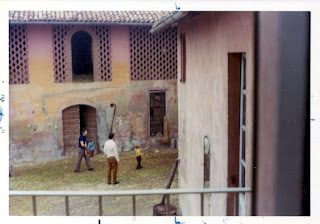Upstairs in the
farmhouse, George’s parents had converted two of the bedrooms into a
living/dining room and a kitchen. The other two rooms remained bedrooms. That
would be our apartment as long as we lived there.
After following
George’s cousins up the stairs, our first stop was the bathroom for the boys,
which was on the landing, just beyond the top of the stairs. Great, I thought, every time they use the
bathroom I’ll worry about them tumbling to their deaths. A plywood and glass wall set off the tiny bathroom
from the main stairwell, but the beveled-glass top half provided a perfect
silhouette of anyone using the toilet and bath.
I made a mental note to sew some curtains, and soon. Inside, the space was too narrow for a
regular bath, so it had been fitted with a short, sit-in tub. A small electric tank overhead looked as if
it could heat just enough water for one moderate-sized person to splash herself
clean.
We pulled the
chain on the cistern above the toilet, and water gushed and swirled. It worked well, and it was inside. George had told me that his parents had
created the bathroom from a small storage area just a few years before. When he had stayed at Gabi in his teens,
their toilet was outside next to the barn, and Zio Remo, who lived in the
ancient house next to ours, still used an outhouse. I thanked God, and my in-laws, for indoor
plumbing. To change their diapers, we lay Margaret Ann and Matthew on a
plastic-covered bed in a large bedroom.
We had used the last of the disposable diapers, so George hauled in one
of our suitcases, and I unpacked the cloth ones.
Laundry was a big concern
for me. The children were young, and they spilled, dropped, and wet themselves
with some regularity. Disposable diapers were not as widely used then as they
are now, and they were expensive. I had always used cloth diapers in
California, and I had no qualms about doing so on the farm. I had not yet been struck by the reality of
washing dirty diapers, wet pajamas, and soiled clothing by hand, and I unpacked
those cloth diapers as if it were the most normal thing in the world. How naïve I was! I thought of myself as a new pioneer woman
carving out a life on the old frontier—strong and brave. I wouldn’t need the
wimpy modern conveniences. If the Italian farm woman could do without, so could
I. What I didn’t realize was that the Italian farm woman didn’t do without.
Maybe her mother or grandmother had, but the modern Italian woman knew how to
take care of her needs. I had made unwarranted assumptions based on very little
experience or knowledge. Young and
naïve, most of my ideas about Italy had been formed through watching old
Italian movies or listening to George talk in vague generalities.
George and a cousin’s
husband exploring the courtyard, James in front. Matthew at the barn door. The "apple house" below. Taken from 2nd floor balcony.



No comments:
Post a Comment